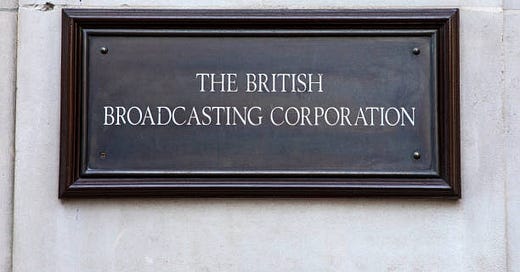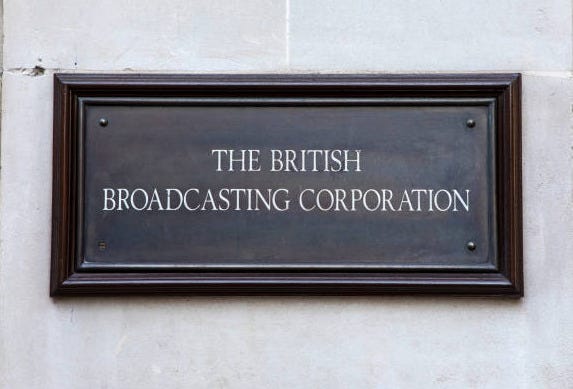THIS WRITER'S JOURNEY is the episodic story of how I came to be offered my first writing commissions for stage, TV (EastEnders initially) and radio (The Archers). My story will be four or five months in the telling. I publish on Thursdays. I hope you’ll want to subscribe.
Previously on THIS WRITER’S JOURNEY
I leave university and, inspired by a romantic novelist who encourages me to take my chances, I give myself a year to write.
I’ve written a play.
I’ve heard that a new writer should write what they know, and so I’ve dramatized the story of something that had happened the previous year.
I’d taken my then boyfriend – an upper-middle-class, long haired hippy – home to meet my working-class Glaswegian, ex-soldier father. Things hadn’t gone well. A clash of cultures, generations and expectations had led to a final scene where my dad had thrown us out of the house. The action in my play was lifted from my life.
Now a script editor at the BBC has read my play. He wants to meet me. The night before the appointment at Broadcasting House, I don’t sleep.
It's 1977, the year of the silver jubilee. In honour of the Queen, the 159 bus that I catch from outside my flat in Brixton has been resprayed in silver. A carpet dotted with royal insignia - crowns etc. - covers the floor of the lower deck. For non-Londoners who might be imagining a city of fancy public transport - please don’t. This was a special bus.
When I arrive, the BBC script editor is waiting for me in Reception. I don’t remember his name.
But I’ll never forget what he said.
He leads me to his office in the bowels of Broadcasting House. It looks a bit like the the office of the careers adviser back at university, small, boxy, in need of a coat of paint. The script editor looks a little like the careers officer. Same sort of age, specs, hair, clothes and so on. The careers man had smiled at me. This man does too.
That’s where the similarities end.
The script editor doesn’t bother with small talk, makes no attempts to put me at ease, offers no tea or coffee or biscuits. He comes straight to his point.
He hates my play. The characters, scenario, action. Everything in it is unbelievable.
I manage to stammer that the piece is based on a real event.
He waves my interruption away. I am wrong. People don’t behave like that, they don’t talk like that. He despises my writing. He loathes it. I am wasting his time. He wrinkles his nose. He holds my script over his bin. I wait for him to drop it in.
Worse. He gives it back. As he pushes it across his desk, he advises me never to write another word.
Why had he invited me in to meet him? Was he a nasty piece of work, getting off on destroying a young woman’s hope? Was he disappointed in his career? Disappointed in love? Jealous of my youth? At the distance of more than forty years, I can only speculate.
I’d like to take a short diversion and talk about authenticity.
When I’m teaching writing I often encourage students to look at Becoming a Writer by Dorothea Brandt. Published in the early 1930s, she was, I believe, the first person to recommend the practice of writing morning pages. I first heard about her book in a talk by Hilary Mantel, who said that if she hit a block in the road, she would turn to it to help her find a way through.
In Becoming A Writer, Dorothea Brandt reminds us that while we share a common humanity and common experiences, in its particulars, each life is exquisitely different. If a writer looks inside themself and explores the detail of their experiences and perceptions, then their work will be original and authentic.
Whatever the script editor said, I knew that people did behave like the characters in my play, that people did talk like that. My experience was authentic, my play was too.
But the man said I was wrong. His experience of life was the correct authenticity.
Less than a decade later, EastEnders will explode onto BBC TV screens. Millions of people will be enthralled by stories that contain interactions very like those in my play. That radio script editor, stuck in his bubble, was soon to be outdated. Perhaps he already was. Perhaps that’s why he was so angry with me?
I didn’t think like this at the time. Back then, as I travelled back to Brixton on an ordinary red bus, I believed everything he’d said was true. He worked for the BBC, his job was to read scripts, he knew what he was talking about. He said the play was bad. It must be bad. He said I was a bad writer. I must be a bad writer. I internalised every word he’d said. The thought of picking up a pen or tapping at a typewriter keyboard made me feel physically ill.
I get home. I drop the play in the kitchen bin.
My dream year is over. It’s time to get real, forget writing and get a job.
If I’d had a different sort of childhood I might, at this point, have followed one of the university careers officer’s suggestions and knuckled down.
But I’d been an army kid, my childhood had been spent following my father’s job, never staying in one place for more than a year or two. Add to this a volatile family life, fuelled by my dad’s drinking and gambling, and it’s no surprise that restlessness was embedded in my DNA. Insecurity was my normal. I was still in my very early twenties. Embarking upon a sensible career in the civil service or banking or law or teaching just wasn’t an option.
So, there I am, sitting alone in my council flat in Brixton, my unloved play festering in the kitchen bin, while I consider what to do.
What am I interested in? I figure that’s the place to start.
The answer seems obvious. If I can’t write plays myself, then I want to walk the worlds of people who can. Inspired by JM Synge’s The Playboy of the Western World, and by Susan Fleetwood’s portrayal of Pegeen Mike, I decide to become an actor.
There is, however, a problem.
In those days, the actors’ union, Equity operated a closed shop. Professional companies were only allowed to employ Equity members.
To get acting work, I’ll need to get an Equity card. To get an Equity card, I’ll need to get acting work.
But theatres, big or small, have an allocation of only two new cards to give away each year and the hundreds of students pouring from the prestigious drama schools are already fighting each other to get their hands on them. Equity cards are more valuable than diamonds.
But I am well-connected in the theatre world.
I tear tickets at the National. A lot of my usher friends are drama students or actors between gigs.
I ask their advice.
They tell me there’s a way around the system.





Gillian, what a horrible experience. You just have been devastated at the time. I look forward to reading the next instalment. Btw, my family were living in Vauxhall at the time of the Silver Jubilee. Not far from Brixton. I have very vague memories, waving as the Queen drove past!
What a cliffhanger!